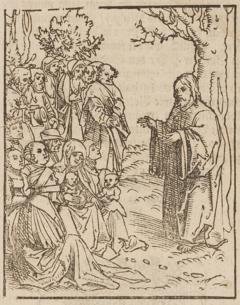Matthew 7:10
Matthew 7:10 is the tenth verse of the seventh chapter of the Gospel of Matthew in the New Testament and is part of the Sermon on the Mount. This verse presents the second of a pair of metaphors explaining the benefits of prayer.
| Matthew 7:10 | |
|---|---|
← 7:9 7:11 → | |
 "The Sermont on the Mount", woodcut by Lucas Cranach the Elder, from his "Passion Christ und Antichrist", Herzog Anton Ulrich-Museum, Braunschweig (1582). | |
| Book | Gospel of Matthew |
| Christian Bible part | New Testament |
Content
In the King James Version of the Bible the text reads:
- Or if he ask a fish, will he give him a serpent?
The World English Bible translates the passage as:
- Or if he asks for a fish, who will give him a serpent?
For a collection of other versions see BibleHub Matthew 7:10
Analysis
The first comparison was bread and stones, this second one has the same metaphor but with a different pair of objects. The basic metaphor of this verse, as with the previous one is that a human father would not refuse a basic desire from his son, so God too would not refuse a basic need of one of his followers, when they ask him.[1] Second to bread fish would have been the main food source for the communities around the Sea of Galilee where Jesus was preaching, and fish and fishing metaphors appear a number of times in the New Testament. As with stones and loaves fish and snakes are somewhat similar in appearance. Both are long thin scaled creatures. A dried fish may look like snakeskin.[2] France notes that a common catch in the Lake of Galilee was the eel-like Clarias lazera, a type of catfish, which looks very much like a snake.[3] Unlike rocks, which were of little use but inoffensive, snakes were considered a dangerous, evil creature and positively harmful.[4] A snake is the form of the tempter in Genesis, and other negative snake metaphors appear in the New Testament. This metaphor is thus somewhat stronger than the previous one.
In Luke there is a third metaphor of a scorpion and an egg, which does not continue the pattern of similar appearances. This metaphor does not appear in Matthew.
References
- Phillips, John (2005). Exploring the Gospel of Matthew: An Expository Commentary. The John Phillips Commentary Series. Volume 1 (reprint ed.). Kregel Academic. p. 125. ISBN 9780825433924.
- Coogan, Michael David (2007). Coogan, Michael David; Brettler, Marc Zvi; Newsom, Carol Ann; Perkins, Pheme (eds.). The New Oxford Annotated Bible with the Apocryphal/Deuterocanonical Books: New Revised Standard Version, Issue 48 (Augmented 3rd ed.). Oxford University Press. p. 17 New Testament. ISBN 9780195288810.
- France, R.T. (2015). Matthew: An Introduction and Commentary. Tyndale New Testament Commentaries. Volume 1. InterVarsity Press. p. 149. ISBN 9780830894833.
- France, R.T. (2007). Bruce, Frederick Fyvie (ed.). The Gospel of Matthew. New international commentary on the New Testament. Wm. B. Eerdmans Publishing. p. 281. ISBN 9780802825018.
Sources
- France, R.T. The Gospel According to Matthew: an Introduction and Commentary. Leicester: Inter-Varsity, 1985.
| Preceded by Matthew 7:9 |
Gospel of Matthew Chapter 7 |
Succeeded by Matthew 7:11 |